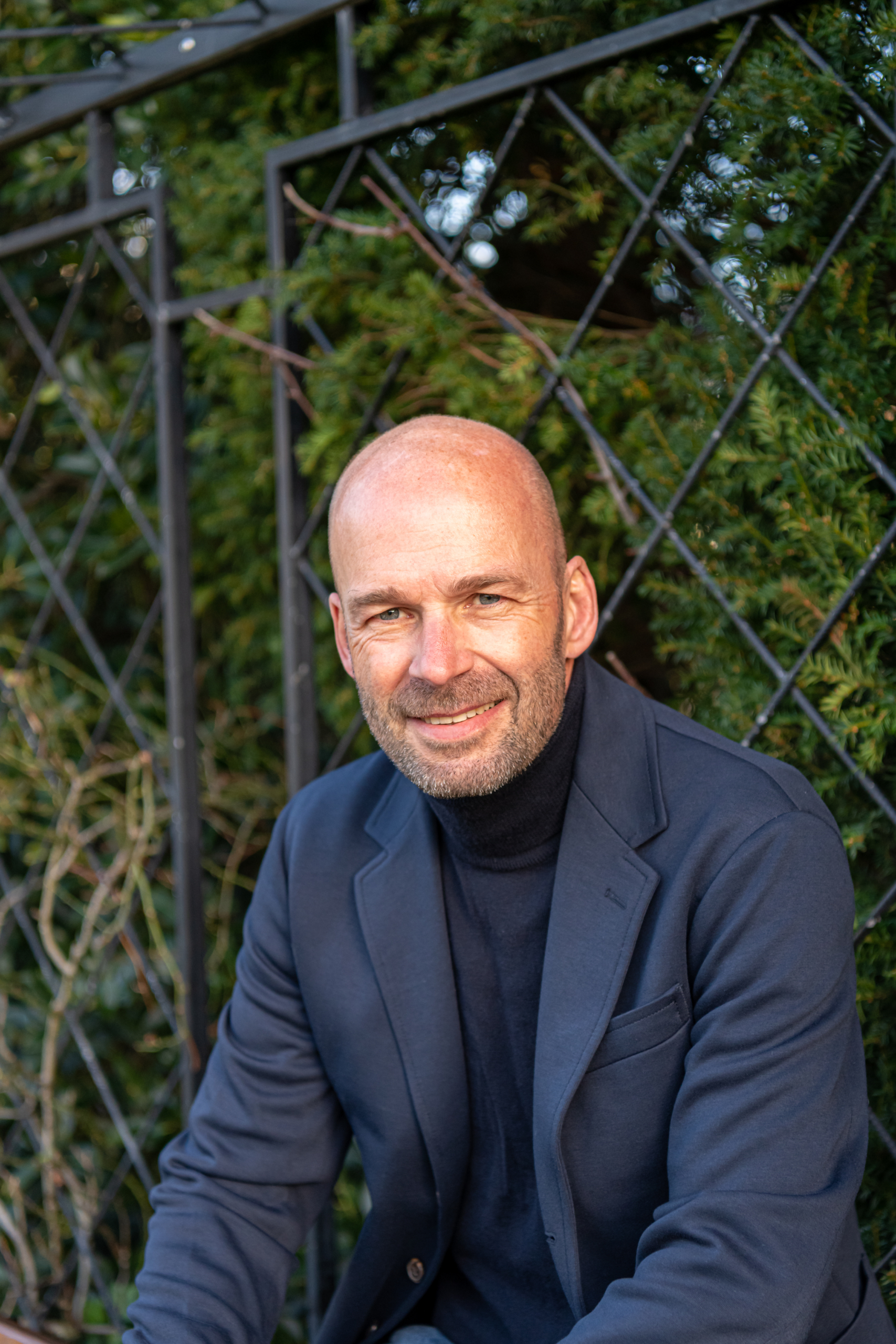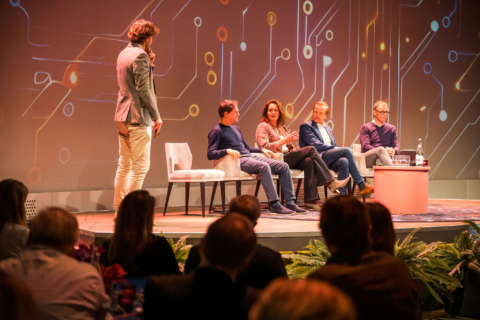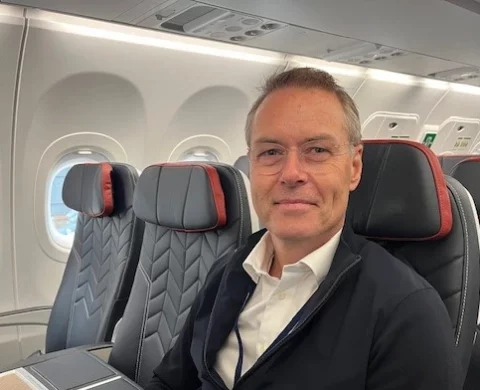
This article is published in Dutch in the TF Magazine 2023-1, you can find it here. It has been translated using AI technology.
Frank Vrancken Peeters, CEO of Springer Nature:
‘We are the oil in the scientific machine’
Throughout the interview, which takes place remotely, an imposing bookcase is visible behind Frank Vrancken Peeters. When asked if it is real, he replies “yes,” and turns to pull out a special copy. It is Springer Nature’s first machine-written book on lithium batteries. An author’s name is missing. ‘We have now published a total of five machine-written books, and they have been positively received,’ explains the Springer Nature CEO. ‘You have to embrace progress. If you let threats dictate your actions, you stand with your back to the future.’
He is very familiar with the latter Like other scientific publishers, Springer Nature is in the midst of a profound transformation process. This is both technological and commercial in nature. In the old model, customers, particularly academic libraries, paid to read scientific publications. In the new model, authors pay publishers to publish their work. The publisher then places that in a database, which is freely accessible to anyone and where anyone can view it. Open access is the name of this form, which is booming. The model meets society’s need for unlimited access to scientific information.
At Springer Nature, over 30 percent of publications currently appear via open access. Vrancken Peeters expects that to be half that by the end of next year, and eventually it should be a hundred percent.
What is the biggest bottleneck in this transformation?
‘As with the switch from paper to digital, it is mainly internal. Open access turns the thinking within the organization upside down. In the past we were rewarded on the basis of selectivity for readers, now we get rewarded by helping authors publish scientifically correct and relevant articles. You have to talk a lot about that. Employees are particularly afraid that open access will lead to a loss of quality and a one-sided pursuit of volume.’
There is that risk, isn’t there?
‘No, because our reputation is our most important asset and that is determined by the quality of our publications. In fact, there is a self-regulating mechanism in it. After all, the quality of a journal would go down if you just published everything. That then leads to fewer submitted articles for that journal. So at the journal level you maintain quality and selectivity, but at the same time you try to develop your portfolio of journals in such a way that there is a home for every relevant and scientifically correct article.’
Are fake texts a major problem in your industry?
‘On that point, technology is both a threat and a solution. We now employ about thirty people who check publications for integrity, for example, plagiarism or copyright of images. Machines can now write a text in such a way that people alone cannot tell if it is fake. For that, our employees also use artificial intelligence and other software.’
Which transformation theme has the most impact on your organization: geopolitics, technology, sustainability or socio-cultural change?
‘That’s a tough choice. We are a global organization with one service, English-language scientific publications, which are published and sold the same way everywhere. Almost all of the research done for those publications comes from scientific communities that cross borders. Neurosurgeons here are directly connected to neurosurgeons in the United States, Asia and anywhere else. We are the oil in that scientific machine, helping those different communities communicate with each other through our network of editors and peer reviewers. Therefore, the creation of geopolitical blocs is very difficult for us. Especially between the U.S. and China, we have seen tension rise. Internally, we have had a lot of discussion following the war in Ukraine. But our principle remains that everyone can publish with us, regardless of regime, religion, race or nationality. We did not exclude Russians. By the way, we decided that with the entire industry. Russian scientists are also working on solutions to global problems such as the climate crisis. You shoot yourself in the foot if you exclude them. But we are no longer commercially active in Russia; we only respect existing contracts.’
‘Machines can already write a text in such a way that you can’t tell it’s fake’
How important is technological transformation to you?
‘Very. When I worked at Elsevier in the 1990s, less than 50 percent of publications were digital; now it’s 90 percent. Technology is important both for the publishing process and for distribution. Artificial intelligence helps us better understand the professional literature, find peer reviewers and combat plagiarism.’
And what is the importance of sustainability and sociocultural change for Springer Nature?
‘We are a purpose-driven organization and work with people who want to have an impact on issues like climate and food, basically the SDGs (Sustainable Development Goals) of the United Nations. We ourselves already operate climate neutral and hope to be that also in scope 3 by 2040. All of our offices, more than a hundred worldwide, have specific climate plans. We are a diverse company, with editors and peer reviewers all over the world. Half of our employees are women, in management over 40 percent. We have more than eight global networks, including for people with disabilities, for lhbtqi people and for parents.’
What gives him great satisfaction is that Springer Nature helps solve social issues, Vrancken Peeters says. ‘Through our magazine Nature, for example, we did a project together with the United Nations on water quality in the oceans. These are multi-year projects where we bring scientists and government officials together to stimulate and coordinate research. That leads to publications in our journals and those of other publishers. You then find that our brand name, Nature, opens doors.’
For him personally, the international aspect of the work is very appealing. ‘I find that enriching, to work with people from different cultures. Next week I will be in India, talking about new technology with the educational team and the scientific division. It’s not offshoring what we’re doing there; we have highly educated people there who are an integral part of our organization. For me, a week like that is hugely inspiring. I come back with extra energy and lots of ideas. I am always very impressed with the mentality in India. They don’t waste too much time in meetings, want to get started right away and adapt continuously and tremendously fast. I’m not surprised that agile working has its origins there.’
Are you trying to introduce that mentality elsewhere in the group as well?
‘Yes, but changing behavior is difficult. In principle, nobody wants to be changed. It only works if you make sure everyone feels like a winner. Give people the feeling that they are in the driver’s seat. Show them what they can gain if they change. Dutch culture helps with that, because we are direct. But we do have to be careful not to come across as rude.’
‘The creation of geopolitical blocs is very difficult for us’
How do you make people feel like winners?
‘By focusing on the benefits the change provides. In doing so, respect that change always creates friction. Ask employees to translate the goal for themselves. Also provide enough incubation time, put enough time into preparation. Before starting implementation, ask yourself the question: do we agree, is there still friction? Don’t act until everyone is on board. That requires a lot of communication, and I spend 20 to 30 percent of my time doing that.’
How do you communicate?
‘I record a video every week. Often those are conversations with employees from across the organization. I try to do that in the form of a natural conversation. The videos are watched by colleagues over lunch or overheard while running. I ask questions like, “What brought you to Springer Nature?” Or I interview someone leading an important strategic project. That started in the corona days. I felt we had to do something to keep Springer Nature from becoming a tab in employees’ browsers. Nobody likes an institution; people do want to know what other people are doing. Colleagues are curious about the person and what drives or engages someone. Similarly, I once made a film about my home life that included my wife and daughters – not entirely to my daughters’ delight, by the way. I also make films about what we do as management during the week. This allows us to show, among other things, the thought process on difficult choices. That helps more with the transformation we are in than abstract stories about strategy. Each time, about 1,500 to 2,000 out of 10,000 colleagues watch those videos. For those people, Springer Nature at that point is not a logo or a company name but it is Frank, and his colleagues on the board. Furthermore, we have regular (virtual) town hall meetings and have webinars especially for newcomers. In fact, we hire about a thousand people every year. In terms of internal communication, all in all that is a huge difference from how we did it ten years ago.’
Important in communicating with employees is that you clearly show your priorities time and time again, Vrancken Peeters says. He prefers to do that in the form of clear, objective goals, such as OKRs (objectives & key results). A condition is that those goals are realistic. “If you normally run a marathon in four hours, it is better to set the goal at just under four hours than at three hours. It gives tremendous energy if you can meet your goal and avoids the frustration that arises when goals seem unachievable early on in the process. Therefore, I do not support the slogan “it’s better to fail aiming high than to succeed aiming low,” as long as low is at least realistic and sufficiently ambitious. I always put realizability first. Otherwise you run the risk of asking too much and people become demotivated.’
What priorities does Springer Nature have?
‘Number one is Purpose, and for us that’s the SDGs. For us as an organization, that is the entrance ticket. It allows us to enter the scientific stadium and on that basis we attract and retain the right people. People, then, is number two. If we do well in the areas of Purpose and People, number three, Profit, and with it the financial rewards for shareholders, will come naturally.’
SDGs to which Springer Nature is committed include education (SDG 4) and reducing inequality (SDG 10). For example, the group has given teachers in Africa easier access to digital learning products, and materials related to corona – 70,000 articles and chapters from books – have been opened up to everyone worldwide free of charge. Vrancken Peeters believes that open access in particular creates more level playing field in science. Scientists in Africa, Asia and Latin America can thus more easily connect to knowledge in the West. For scientists in the global South, among others, Springer Nature has lowered the threshold for open access. Per year, Springer Nature awards a total of 20 million euros in exemption from publication fees.
Finally, what kind of leader are you?
‘I hear that I am transparent, results-oriented, pragmatic, analytical and structured. Also that I am very Dutch: quite direct and striving for consensus in meetings. I always look carefully at how to do something. First comes the what, then the how and finally how to monitor progress. Often people forget the implementation of a plan and get stuck in enthusiastic ideas. I think it’s important to take a good look in advance at who is going to carry it. I always ask myself with strategic projects: when will we be satisfied a year from now, what is really important and what can we let slide? Too many priorities leads to chaos and stress. Furthermore, it should be fun to work together, so I find humor and relaxation in the team important. We usually have two days of board meetings per month and try to end the first day with an activity and dinner. I once really surprised our team by going bowling with them in Scheveningen with French fries on the side.’
What gives you satisfaction?
When someone I haven’t seen for a while says to me that he or she has learned something from me. That touches me. I like that more than a compliment for a successful reorganization or a smart acquisition.’
Do you yourself like new technology?
‘Yes, just yesterday I had ChatGPT create a poem for my wife. She really liked that, but she couldn’t imagine it was mine.’
Because it was so good?
‘No, because I never write poetry.’
Springer Nature and Frank Vrancken Peeters
Springer Nature is a global scientific publisher with sales of 1.7 billion euros and about 10,000 employees. The group publishes nearly 3,000 scientific journals. Together with Elsevier, Wiley and Oxford University Press, among others, it ranks among the global top scientific publishers. Frank Vrancken Peeters is originally a business administrator. He previously worked mainly in commercial positions at companies including Shell, Elsevier and Wolters Kluwer. Since 2019, he has been CEO of Springer Nature.



